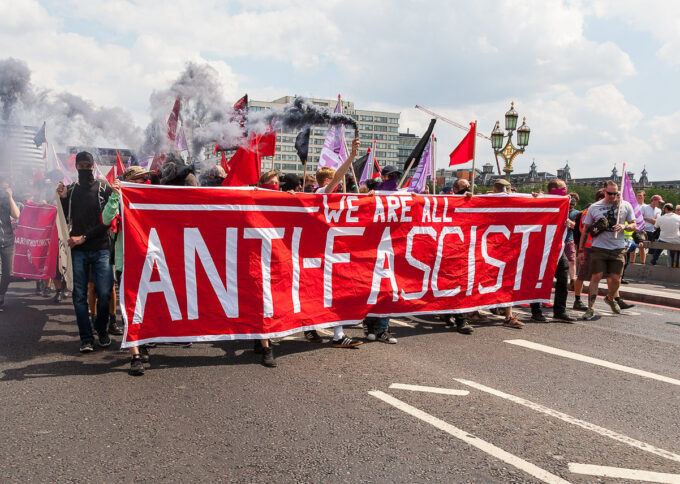Source article originally published on
Article Summary and/or Excerpt:
In the dominant liberal political imaginary, fascist and far-right movements are framed as problems of hate and extremism. [1] The global extremism industry – a network of government ministries, intelligence agencies, military and police forces, university research centers, think tanks, media outlets, and government-oriented NGOs – dutifully serves the ruling class by occluding liberalism’s complicity with fascism by placing antifascist movements on an extremism spectrum that also includes violent fascist formations, a mystification aimed at policing the Left and criminalizing antifascists.
Given the tangle of distortions concerning how fascism is understood, research-based information and analysis from radical and critical perspectives are crucial for antifascist resistance. [3] Antifascist histories and the lessons that can be drawn from past struggles have been the focus of two recent U.S.-based academic projects. A conference on “Anti-Fascism in the 21st Century,” hosted by Hofstra University and organized to coincide with the centenary of the March on Rome, brought together scholars and activists from the United States, Canada, and Europe in early November 2022. [4] Also launched at the same time, The April Institute is a collective organized to advance public knowledge about the long history of antifascism in the United States. In stressing the importance of antifascist projects informed by scholarship that excavates movement histories, this work differs from much of the research in the field, whose narrow focus on hate crime, terrorism, and ideologically-motivated violent extremism (IMVE) deploys conceptual frameworks which shore up agendas set by the state security apparatus but contribute little to an understanding of the dynamics of fascism in crisis-riven capitalist societies. [5]
In noting the prevalence of distorted and shallow understandings of fascism, the result of which is that “the public understanding of contemporary fascist tendencies lacks the context of their deep historical roots” such that “those engaged in resistance are deprived of the insights gained by a long antifascist tradition,” the Institute’s mandate reflects its antifascist activist alignments: (i) “To promote a deeper understanding of the troubling history of fascist movements in the United States and to cultivate our ability to identify contemporary warning signs”; (ii) “To recognize, communicate, and celebrate the rich tradition, creativity, and success of antifascist organizing and cultural production in the United States”; and (iii) “To consider the social and material conditions that give rise to fascist movements as well as the ways we can imagine, build, and sustain inclusive and democratic communities.”.[6]
As part of its inaugural six-part series on “U.S. Fascism and Antifascism: Past and Present,” the Institute organized panels featuring prominent Marxist, anarchist, and progressive scholars discussing the themes of “U.S. Fascism: Origins, Patterns and Continuities” and “Antifascist Histories: Models for Resistance.” [7] Its ambitious schedule of programming for 2023 involves four research and public education projects: (a) exhibitions on Black antifascism in the wake of Mussolini’s invasion of Ethiopia; a second on fascist politics and antifascist resistance at the 2017 “Unite the Right” rally in Charlottesville; and one on a mass-based antifascist league during the 1930s; (b) promotion of new interdisciplinary scholarship; (c) collaboration with secondary and post-secondary educators; and (d) a variety of physical and digital memorialization projects.
